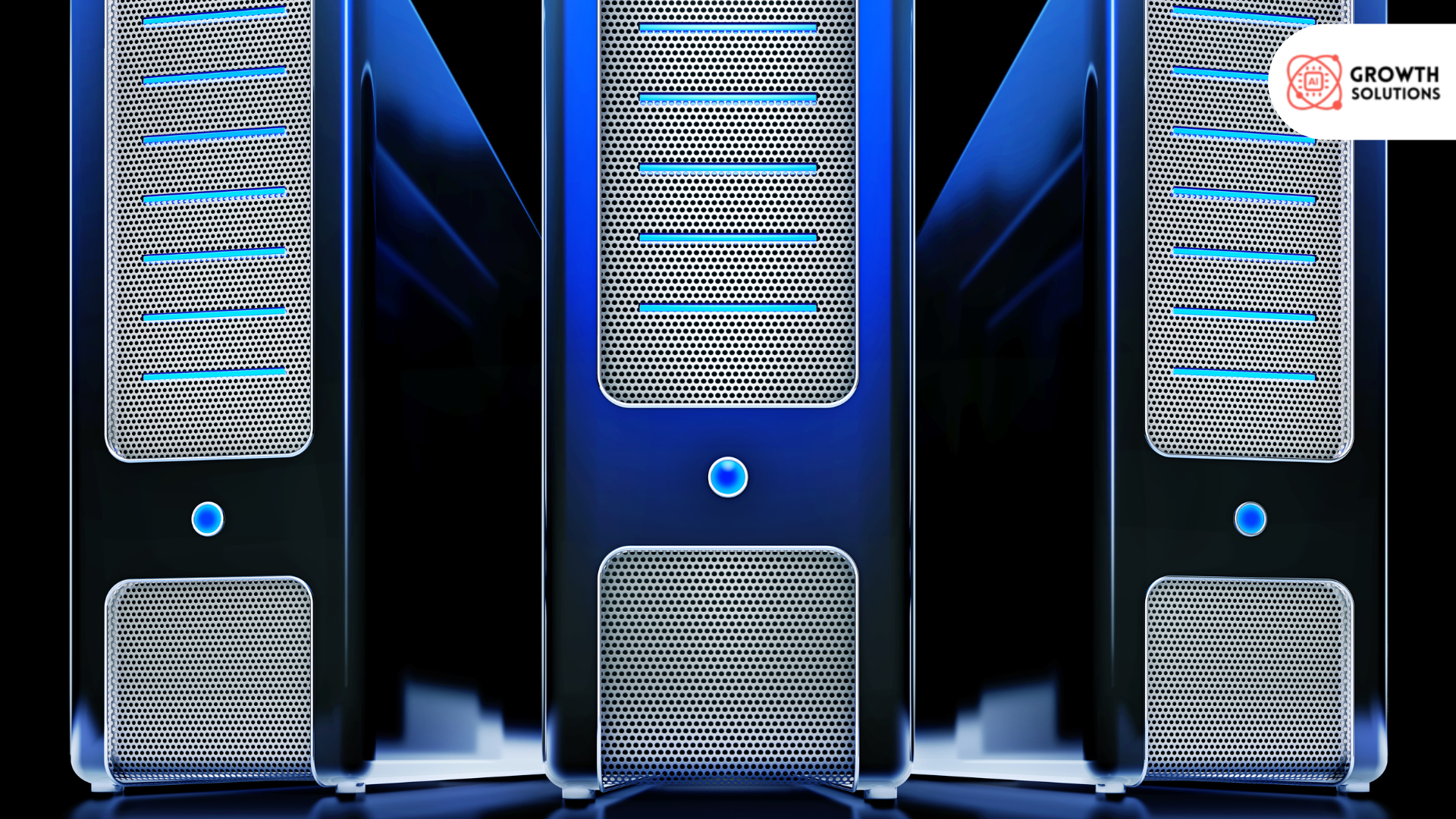18554493114
Call us for any question.
- support@aigrowth-solutions.com
- 349 Blue Point Rd Farmingville, NY 11738,USA
Call us for any question.
18554493114
Search for products
Blog Detail
- Home
- Blog
- Details
How to Choose the Right Server Hardware?
Choosing the proper server hardware is crucial for your IT infrastructure's efficiency and long-term success. Whether hosting websites, running data-intensive applications, or managing a fleet of virtual machines, selecting the proper hardware will optimize performance, minimize downtime, and reduce costs. At Ai Growth Solution, we specialize in helping businesses navigate these decisions, ensuring you get the best return on your server investment.
Here's a comprehensive guide on choosing the proper server hardware for your needs.
1. Understanding Server Hardware and Its Importance
Server hardware forms the backbone of your digital operations, from hosting websites to storing sensitive data. Choosing the right components is essential for the scalability and reliability of your business infrastructure. The wrong choice could result in performance bottlenecks, frequent outages, and operational costs. With Ai Growth Solution's Servers & Services Installation, we ensure you make informed decisions to match your business needs.
2. Types of Servers: Which Is Right for You?
Depending on your business model, different types of servers serve distinct purposes:
- Dedicated Servers: Ideal for businesses requiring complete server hardware control for maximum performance.
- Virtual Servers: Suitable for businesses looking to virtualize multiple workloads on a single physical server.
- Cloud Servers: If scalability and on-demand resources are your priority, cloud servers provide unparalleled flexibility.
- Hybrid Servers: Combining the benefits of physical and cloud infrastructure, hybrid servers can help businesses manage fluctuating demands efficiently.
3. Server Use Case: Tailoring Hardware to Your Business Needs
Your specific workload should dictate the type of server hardware you choose. For instance:
- Web Hosting: You'll need a reliable CPU and sufficient memory to serve numerous concurrent visitors.
- File Sharing: High storage capacity and redundancy are crucial.
- Database Management: A high-performance processor with ample RAM is essential for fast data retrieval.
- Virtualization: Servers should support a high core-count CPU and ample memory.
- Big Data and Analytics: High-throughput, data-intensive applications need scalable storage, multi-core processors, and extensive memory resources.
4. Processor (CPU): The Heart of Your Server
When selecting a suitable processor, consider both core count and clock speed. A higher core count is essential for multitasking and handling numerous threads simultaneously, critical for virtualization or database servers. If your server needs to perform intense calculations or handle CPU-heavy tasks, opt for CPUs like Intel Xeon or AMD EPYC processors, known for their server-grade performance.
- Multi-threading: Allows each core to handle more tasks simultaneously.
- Parallel Processing: For high-end workloads like AI/ML, parallelism can significantly enhance processing efficiency.
5. Memory (RAM): Critical for Performance
The amount and type of RAM directly impact how smoothly your server operates. DDR5RAM can provide faster data transfer rates for performance-critical environments compared to DDR4. ECC memory (Error-Correcting Code) is crucial for servers, ensuring data integrity by detecting and correcting memory corruption. At Ai Growth Solution, we recommend a minimum of 32 GB for moderate workloads, but high-use scenarios may demand 128 GB or more.
6. Storage Solutions: Balancing Speed and Capacity
Storage choice is more than just about capacity. It would help if you considered speed, reliability, and redundancy:
- HDD vs. SSD: Traditional HDDs offer higher capacity at a lower cost, while SSDs deliver superior performance, especially in data-heavy environments.
- RAID Configurations: To protect against data loss, RAID 1 for mirroring or RAID 10 for redundancy and performance is advisable.
- NVMe Storage: If you need high-speed data access, NVMe drives can dramatically boost I/O operations for applications requiring rapid data processing.
7. Network Interface (NIC): Ensuring Fast and Reliable Connectivity
The network interface card (NIC) is crucial for businesses relying on real-time data. 1Gbps NICs may suffice for most businesses, but upgrading to a 10Gbps network is critical for data-heavy operations. Furthermore, load balancing and failover support ensure that your servers remain connected during peak loads or hardware failures. At Ai Growth Solution, we assess your bandwidth requirements and recommend NICs that meet those demands without over-provisioning.
8. Power Supply: Avoiding Downtime and Failures
A server's power supply is often overlooked but is a critical component. Redundant Power Supply Units (PSUs) ensure that your server remains operational even if one unit fails. Look for 80 PLUS-certified PSUs for energy-efficient power supplies, reducing energy costs. A UPS (Uninterruptible Power Supply) is also advisable for short-term protection against power outages.
9. Cooling Solutions: Keeping Your Server at Optimal Temperature
Servers generate heat, and poor cooling can lead to hardware failure. Liquid cooling offers better performance than traditional air cooling in high-density server environments. If running a small data centre or colocating your servers, you must invest in rack optimization and server room temperature control systems. Proper airflow management can prevent overheating and extend the lifespan of your hardware.
10. Form Factor: Choosing the Right Design
The form factor of your server is another critical consideration:
- Rack Servers: Designed for high-density data centers and scalable environments.
- Tower Servers: A more traditional form factor, ideal for small businesses or less demanding applications.
- Blade Servers: Perfect for maximizing space, blade servers allow you to fit multiple servers into a compact footprint.
Ai Growth Solution helps you evaluate your current and future space needs, ensuring that your server form factor aligns with your business objectives.
11. Expansion and Upgradeability: Future-Proofing Your Investment
Consider the server's ability to expand as your business grows. PCIe slots allow for upgrades like additional NICs or GPUs. Hot-swappable components like drives and PSUs make it easier to manage failures without downtime. Ai Growth Solution always advises planning for future upgrades to avoid costly overhauls later.
12. Server Management Tools: Simplifying Operations
Reliable server management tools are crucial for monitoring and maintaining your hardware:
- Remote management capabilities such as IPMI, iDRAC, or ILO enable administrators to troubleshoot servers remotely.
- Monitoring health: Monitoring software can alert you to potential hardware failures before they become critical.
- Hypervisor software: For virtualized environments, a robust server OS is essential for managing virtual machines.
13. Security Features: Protecting Your Data
In today's world, hardware-based security is non-negotiable. Look for features like TPM (Trusted Platform Module), Secure Boot, and hardware encryption support to secure data at rest. Ai Growth Solution ensures that all servers come with BIOS-level security updates to mitigate vulnerabilities as soon as they are discovered.
14. Budget Considerations: Balancing Cost and Performance
Your server choice should balance cost with performance and future scalability. While initial hardware costs are significant, consider the total cost of ownership (TCO), including warranty, support, and energy consumption. A slightly higher upfront investment in quality hardware often pays off in reduced maintenance and better efficiency.
15. Vendor Support and Warranty: Ensuring Business Continuity
Not all server vendors are equal. Choose vendors known for reliable warranty terms, on-site support, and easy access to replacement parts. Ai Growth Solution works with trusted partners to ensure your hardware comes with strong after-sales support, keeping your servers operational and reducing downtime.
16. Conclusion: Making the Right Choice with AI Growth Solution
Choosing the proper server hardware doesn't have to be overwhelming. At Ai Growth Solution, we guide you through every step of the process, from assessing your current needs to future-proofing your infrastructure. Whether you're just starting or scaling to new heights, we ensure that your server hardware delivers the performance, reliability, and security you need to succeed.
By following this guide, you'll be well-equipped to make an informed decision about your server hardware that aligns with your business objectives and growth plans.
Category
Servers & Services Installation
Previous Post
What is the Process to Install Smart Lighting Systems?
At Ai Growth Solution, we specialize in bringing cutting-edge technology into your home with our exp...
Next Post
What is G-Suite and How Does It Benefit Users?
In today's fast-paced world, efficient digital tools are crucial for personal and professional s...
Today's businesses span borders, requiring versatile solutions.



 Admin
Admin
